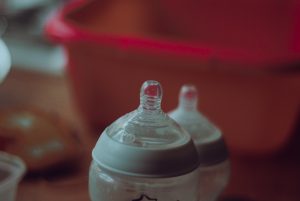Consumer concerns may lead to a stronger fight against the manufacturer of a wildly popular tumbler. The Stanley Quencher cup yielded an impressive revenue stream for the company, with $750 million in sales in 2023. This sales number is a massive jump from the $75 million in Quencher sales earned in 2022. Perhaps some of the more enticing features of the tumbler include its spectrum of colors, longevity of desired beverage temperature, and monogram design options. One of the newest components to the product, as showcased by social media influencers, is the possible presence of lead within the tumbler.
Continue readingTag Archives: FDA
Parents are Fed Up
Following a February 2022 recall of specific lots of baby formula, parents have initiated lawsuits, seeking compensation for infant sicknesses that may be directly attributed to Similac and Enfamil brands. The deaths of two babies triggered Abbott Nutrition to issue a recall of Similac, EleCare and Alimentum batches that were manufactured at its Sturgis, Michigan facility, under which the FDA and Abbott continue to investigate. The issue has expanded to impact users of Enfamil, which is manufactured by Mead Johnson. When consumed, premature infants may suffer from the potential side effect known as necrotizing enterocolitis (NEC). Continue reading
Lawsuit Fails to Pacify Consumers
Following complaints of toxic metals in baby food, the US House of Representatives Subcommittee on Economic and Consumer Policy issued a request for manufacturer testing data, which indicated levels of arsenic, lead, cadmium, and mercury. Although the report was requested in November 2019, one of the manufacturers, Beech-Nut, just recently issued a recall on June 9, 2021. Due to the discovery of high levels of naturally occurring inorganic arsenic, Beech-Nut is permanently discontinuing its infant rice cereal. As the FDA does not restrict the levels of heavy metals in baby food, this recall was voluntary. Consumers, however, are not satisfied with the recall and have filed lawsuits, claiming the heavy metals in baby food lead to issues in infant brain development. Continue reading
Prescribing a Possible Birth Defect
If a birth defect is a potential side effect, then morning sickness may be worth it. Although not FDA approved to treat morning sickness, the manufacturer of Zofran, GlaxoSmithKline, encouraged doctors to prescribe this anti-nausea pill to expectant mothers. In 2009, Zofran was the leading anti-nausea medication prescribed to pregnant women, however, women were not warned of the potential harm this drug could cause their unborn children. The possible dangers of Zofran did not become known until children were born with birth defects, such as cleft palate, heart, mouth, and musculoskeletal defects, jaundice, club foot, and organ abnormalities. Typically, Zofran is only used to treat nausea after surgery or chemotherapy. As a result of so many cases of birth defects linked to Zofran use, many people have chosen to file mass tort lawsuits for compensation. Continue reading
LaCroix’s Cross to Bear
The beverage company’s sparkling reputation has been tainted by a new lawsuit filed in early October. It is the hope of the plaintiff that the case will reach class action status, as all LaCroix consumers are subjected to the apparent false advertising and deception of LaCroix’s parent company, the National Beverage Corporation. The company markets all-natural ingredients in their products, however, the plaintiff alleges that the “natural essences” of LaCroix’s sparkling water are accompanied by synthetic and potentially harmful chemicals. Continue reading




